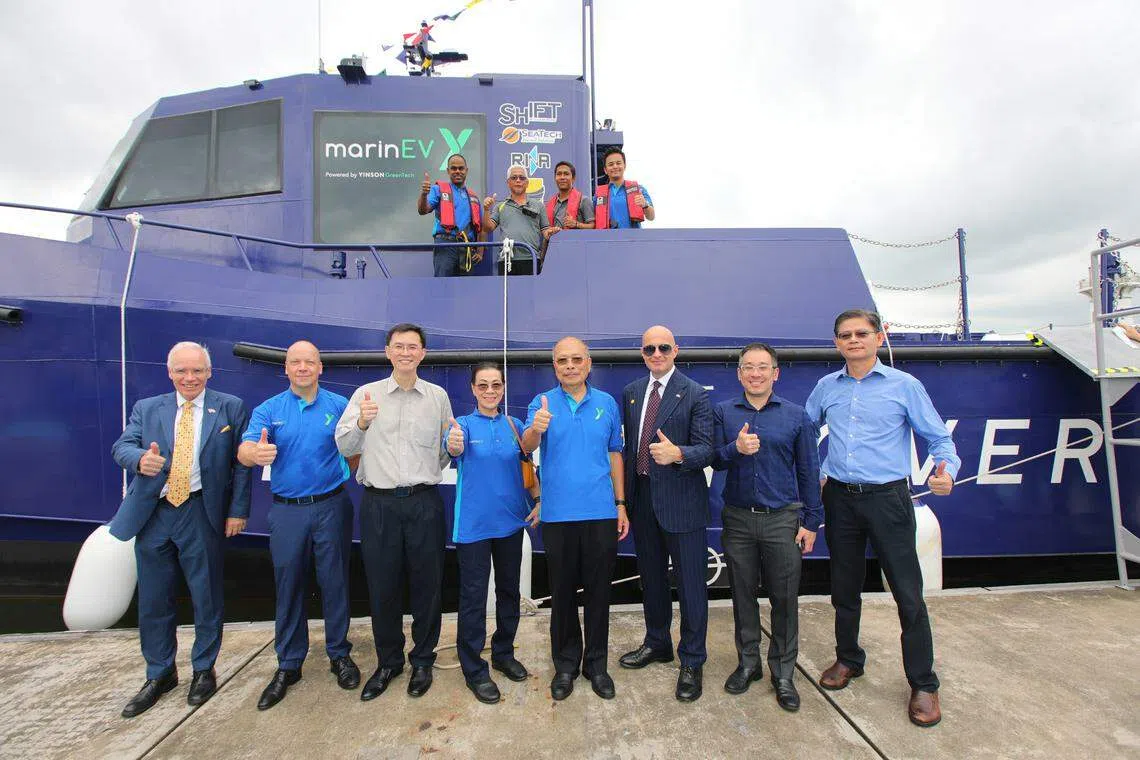Singapore’s first electric cargo vessel debuts

Derryn Wong
THE FIRST fully-electric cargo vessel in Singapore was launched by consortium Goal Zero on Thursday (Nov 23) at Raffles Marina.
The Goal Zero consortium is led by Singapore-based SeaTech Solutions, which designed the vessel.
Yinson GreenTech (YGT), a subsidiary of Bursa-listed Yinson Holdings, was responsible for programme management, system solutions and commercialisation, with Shift Clean Energy as battery technology partner.
The Singapore branch of Registro Italiano Navale handled classification.
Eirik Barclay, chief executive officer of YGT, said: “We are confident of reaping significant advantages from being an early mover in the race to reach net zero emissions by 2050, and we are pleased to already be in talks with supportive financing partners and potential equity partners.”
Goal Zero was one of three consortiums awarded funding in August 2021 to develop and pilot fully-electric harbourcraft in Singapore by a joint Maritime and Port Authority of Singapore (MPA) and Singapore Maritime Institute (SMI) initiative.
Navigate Asia in
a new global order
Get the insights delivered to your inbox.
MPA assistant chief executive (Industry and Transformation), Kenneth Lim, said: “The knowledge and capabilities gained through the development of the electric lighter craft will certainly add to the industry’s understanding of electric harbourcraft designs and technology options for cargo transport vessels.”

The project was partly financed by UOB . Eric Lian, the bank’s head of group commercial banking said the launch of the Hydromover will “drive the revolution of cargo transportation” in the maritime industry.
He added: “As the lead bank to finance YGT’s development of the prototype, we are pleased to support this achievement, and the efforts of MPA and SMI to promote sustainability through innovative green projects.”
YGT said five potential partners have provided letters of intent to charter the Hydromover for operational trials with a view to possible future adoption of the craft into their fleets.
Two are Goal Zero consortium members – Lita Ocean and DM Sea Logistics – along with OPL Services, RW Marine Services and Tian San Shipping.
YGT’s Barclay added that it received expressions of interest from “across the region including Indonesia” and has begun talks with interested parties.
Since the craft is powered by batteries, it will not create local pollution or emissions, although its total emissions are dependent on the type of energy used to charge it.
Barclay said that the vessel will cost around S$2 million, or roughly 50 per cent more than a comparable conventional craft. YGT said that the craft can “potentially reduce operational costs by up to 50 per cent compared to conventional vessels due to improved energy efficiency and lower maintenance costs”.
Named Hydromover, the vessel is 18.5 m long, can carry up to 25 tonnes of cargo, has space for 10 passengers, and has an operating speed of eight to 10 knots. It has two 235 kilowatt engines, and uses a 422 kilowatt hour lithium ion battery pack, which gives a range of 40 nautical miles. The battery can be charged by plugging it into a charger, or it can be swapped.
It is classified as a harbourcraft, meaning it will only ply Singapore waters. Prabjot Chopra, vice-president of technology for SeaTech, said that Hydromover is a prototype, but that the technology has other potential use cases for “all harbour operations” including ferries.
UOB’s Lian said that there is “significant growth potential for electric vessels” as there are around 1,600 harbourcraft operating in Singapore waters.
The MPA has also mandated that from 2030, all new harbourcraft operating in Singapore port waters must be fully electric or be capable of using B100 biofuel, or be compatible with net-zero fuels such as hydrogen.
*Amendment note: An earlier version of this story incorrectly stated that the MPA requires all harbourcraft to be fully electric or compatible with net zero fuels from 2030. This is incorrect as the MPA will require all new harbourcraft to be fully electric, be capable of using B100 biofuel, or compatible with net-zero fuels from 2030. The article above has been revised to reflect this.
Decoding Asia newsletter: your guide to navigating Asia in a new global order. Sign up here to get Decoding Asia newsletter. Delivered to your inbox. Free.
Copyright SPH Media. All rights reserved.

